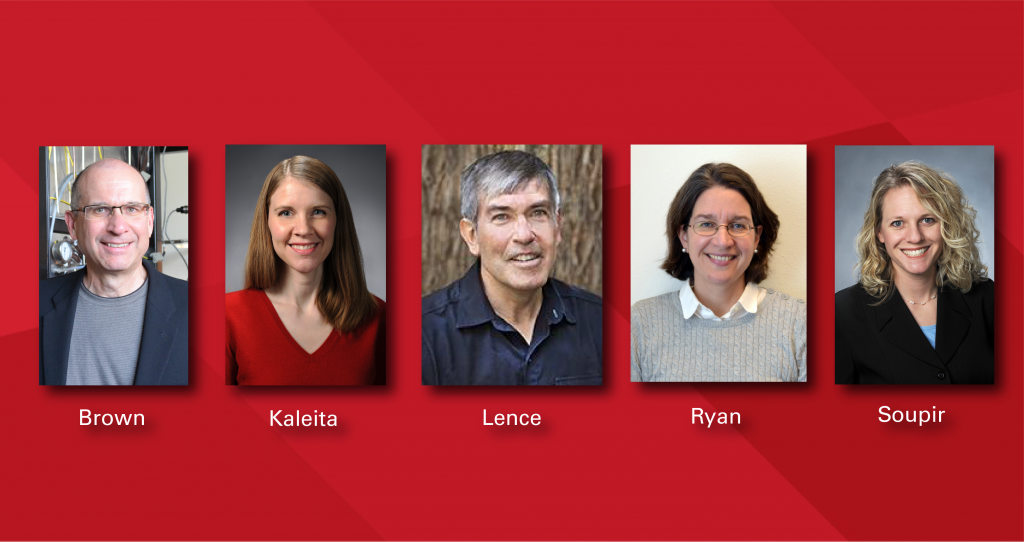
A National Science Foundation (NSF) grant awarded to an interdisciplinary team led by an industrial engineering faculty member will combine elements of engineering with agriculture, economics and sociology to prepare research-based graduate students for an array of career paths.
Sarah Ryan, Joseph Walkup Professor in industrial engineering (IE), will serve as the Principal Investigator (PI) on a nearly $3 million grant awarded by NSF’s Division of Graduate Education. Ryan said this traineeship project will help to prepare research-based graduate students for a variety of career paths, including research scientists, bioeconomy entrepreneurs, agribusiness leaders, policy makers, agriculture analytics specialists and professors.
“The research theme is data-driven systems modeling and decision making to more efficiently produce food, transform primary energy sources into energy carriers, and enhance water quality. The interactions among these three efforts create opportunities to improve the design and operation of all three systems together,” Ryan said.
Through this project, the research team will train 48 M.S. and Ph.D. students, including 24 funded Ph.D. trainees, from agricultural and biosystems engineering (ABE), agronomy, industrial engineering, mechanical engineering, and natural resource ecology and management.
In addition to Ryan, the research team consists of four co-PIs, all of whom bring a different set of expertise: Robert C. Brown, distinguished professor and Gary and Donna Hoover Chair in Mechanical Engineering; Amy Kaleita, professor of ABE; Sergio Lence, professor of economics and Marlin Cole Chair of International Agricultural Economics; and Michelle Soupir, associate professor of ABE.
“The research is inherently interdisciplinary and requires understanding of how food, energy and water systems interact. Some of the PIs and core participants bring expertise in one or more of those domains,” said Ryan. “We also have team members that focus on the economic and sociological aspects of implementing solutions in the context of Midwest agriculture as well as team members with expertise in systems modeling and data analytics.”
Ryan’s IE expertise on the project will focus on systems perspective and emphasis on modeling, analysis, simulation and optimization for making better decisions.
“The IE capabilities for specifying objectives, identifying constraints, and recognizing opportunities for innovation help us to manage tradeoffs in complex systems,” Ryan said.
The traineeship program will cover four components. First, trainees will develop a fundamental understanding of interactions among food production, water quality and bioenergy; data acquisition, visualization, and analytics; complex systems modeling for decision support; and the economics, policy and sociology of the food, energy and water (FEW) nexus.
Second, participants will conduct interdisciplinary research on technologies and practices to increase agriculture’s contributions to energy supply while reducing its negative impacts on water quality and human health, data science to increase crop productivity within the constraints of sustainable intensification, and decision sciences to manage tradeoffs and promote best practices among diverse stakeholders.
Next, they will participate in a new graduate learning community consisting of a two-year series of workshops that focus in alternate years on the context of the Midwest agricultural FEW nexus and professional development, with emphasis on communication, entrepreneurship and collaboration.
Finally, they will have small-group experiences to promote collaboration and peer review. Each trainee will create and curate a portfolio that combines artifacts from coursework and research with reflections on the broader impacts of their work.
Gül Kremer, professor and C. G. “Turk” and Joyce A. Therkildsen Department Chair in Industrial and Manufacturing Systems Engineering, said that this traineeship program will be immensely beneficial to all graduate students involved.
“With experience as Director of Graduate Education and a national reputation for her scholarship no further testament is needed for Dr. Ryan’s preparation to lead this project,” said Kremer. “The FEW area Dr. Ryan and the whole PI and trainee team will tackle is very complex, involving technical matters across disciplines but also appropriateness to context considerations. I cannot think of a better team, a better leader for this task inspiring all of us to be better with our contributions to this critical area for our state.”
Work on this project began earlier this month and the traineeship funding continues through August 2023.